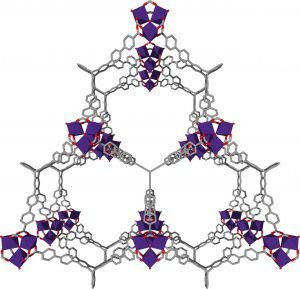Research
Gas storage method with nanoscopic pores could help next-generation clean energy vehicles
April 16, 2020

A research team led by Northwestern University has designed and synthesized new materials with ultrahigh porosity and surface area for the storage of hydrogen and methane for fuel cell-powered vehicles. These gases are attractive clean energy alternatives to carbon dioxide-producing fossil fuels.
The designer materials, a type of a metal-organic framework (MOF), can store significantly more hydrogen and methane than conventional adsorbent materials at much safer pressures and at lower costs.
“We’ve developed a better onboard storage method for hydrogen and methane gas for next-generation clean energy vehicles,” said Omar K. Farha, who led the research. “To do this, we used chemical principles to design porous materials with precise atomic arrangement, thereby achieving ultrahigh porosity.
Adsorbents are porous solids which bind liquid or gaseous molecules to their surface. Thanks to its nanoscopic pores, a one-gram sample of the Northwestern material (with a volume of six M&Ms) has a surface area that would cover 1.3 football fields.
The new materials also could be a breakthrough for the gas storage industry at large, Farha said, because many industries and applications require the use of compressed gases such as oxygen, hydrogen, methane and others.
Farha is an associate professor of chemistry in the Weinberg College of Arts and Sciences. He also is a member of Northwestern’s International Institute for Nanotechnology.